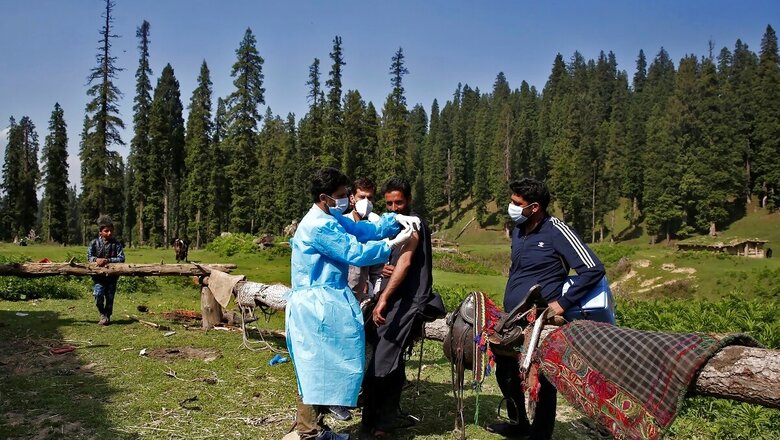
views
On August 5, 2019, the Indian government revoked the special status granted to the state of Jammu and Kashmir (J&K) under Article 370 of the Constitution. The decision was met with widespread approval, both among the citizens and the country’s political parties. In a recent ABP-C Voter survey, 47.4 per cent of respondents said that abrogation of Article 370 was the biggest achievement of Narendra Modi government’s second term.
The second decision taken on August 5 regarding the breakup of J&K into two Union Territories was considered by many as heavy-handed. However, in his speech in Parliament, the Home Minister, Amit Shah, said that “when things normalise, we have no problem granting full statehood to Jammu and Kashmir.” That moment appears to have come.
CNN-News 18 broke the news on Sunday that Prime Minister Narendra Modi would be discussing the restoration of J&K’s statehood when he meets mainstream political parties from the region on June 24. If the news is accurate, this heralds a very positive step.
The Much-needed Release
There were two opposing narratives after August 5, 2019. The first declared that Kashmir would erupt in a wave of protests of the type seen in 2016. The second narrative extolled the virtues of the government action and promised that this would usher in a new era of economic development. Both narratives have been proved wrong.
Violence has remained controlled, although the recruitment of local youth into terror ranks remains an area of concern. The shock of the August decisions, the massive presence of security forces, and the first and second wave of COVID-19 have probably kept people off the streets in Kashmir. The promised development is also not visible. Shutting down the union territory and cutting off the internet completely stunted economic activity. An assessment conducted by the Kashmir Chamber of Commerce estimated that Kashmir’s economy incurred losses of up to $5.32bn in the period between August 2019 and June 2020.
In the Army, we often described J&K as a pressure cooker that could blow up if not provided a release. The decision to restore statehood could offer the much-needed release.
In a situation of uncertainty and fear of the future, hope is a sustaining emotion. In their study Emotions in Conflict: Correlates of Fear and Hope in the Israeli-Jewish Society, Eran Halperin, Daniel Bar-Tal, Rafi Nets-Zehngut, and Erga Drori write, “Intractable conflicts are prevalent worldwide and in all of them emotions play an important role. Some of these emotions fuel the conflict and prevent its peaceful resolution, while others are necessary to embark on the road of peace. In the first category, fear is a most central emotion, while in the other one hope best symbolizes the attempt to change and opt for peace.”
The hope that people would have a voice in an elected state leadership could provide a sense of empowerment among the population. It would also help counter the feeling that New Delhi seeks to impose its will without considering the popular sentiment.
ALSO READ | When Delhi Honours J&K Statehood Promise, It Mustn’t Lose Upper Hand Gained from 2019 Reforms
Grant of statehood and the elections, when held, would be a welcome return to the democratic political process with the full participation of the regional parties. Although the People’s Alliance for Gupkar Declaration (PAGD), a grouping of several regional political parties, has called for the restoration of J&K’s constitutional status, it would not be averse to contesting state elections.
Prime Minister Modi’s meeting with regional political leaders is an acknowledgement that the local parties have an essential role in moving J&K towards normalcy. The 2020 District Development Council (DDC) elections, in which the PAGD emerged as the biggest alliance, showed that the National Conference and the Peoples Democratic Party still command popular support in the Kashmir region. There is also the danger that sidelining mainstream political parties will only strengthen the separatists who will step in to fill this vacuum.
Implications beyond Borders
Restoration of statehood for J&K also has implications beyond the borders. India has endured regular international criticism over its handling of the Kashmir issue after the August 2019 decision. Although much of the criticism was rebuffed, India could have done without the constant scrutiny of its human rights record. Normalisation of the political process in J&K will serve to strengthen India’s democratic credentials and counter some of the anti-India narratives.
There is much confusion among the Pakistani political leadership on the Kashmir issue. Foreign Minister Shah Mahmood Qureshi stated in a TV talk show that revocation of Article 370 was India’s “internal matter.” Following a backlash, he later withdrew his remarks. Notwithstanding the rhetoric, Islamabad would be aware that the grant of statehood is the only feasible proposition. With this reality, both countries could move forward to revive some of the confidence-building measures like the cross-LoC bus service and trade, which had been stopped.
It has been reported that the PAGD would meet on June 22 to discuss the response to the Centre’s invitation for the all-party meeting on June 24. It would be good if some of the past bitterness is kept aside and the regional parties take this opportunity of a return to elected democracy in J&K that is on par with other states in the country.
Read all the Latest News, Breaking News and Coronavirus News here.




















Comments
0 comment